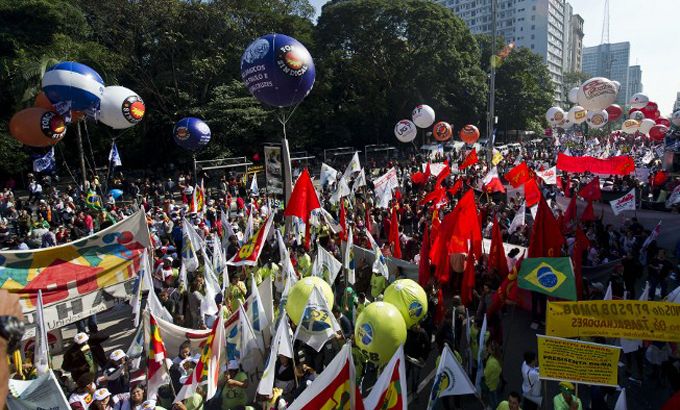Brazil unions stage nationwide protests
Workers demanding better public services and working conditions take to the streets for “Day of Struggle”.

Tens of thousands of workers across Brazil have walked off their jobs and taken to the streets in a nationwide strike demanding better working conditions and improved public services in Latin America’s biggest nation.
Metalworkers, transportation and construction workers and civil servants adhered to the “Day of Struggle” organised by the country’s five leading labour federations on Thursday.
Keep reading
list of 4 itemsZimbabwe’s illegal forex dealers use WhatsApp to find clients, evade police
China’s Xi Jinping begins first Europe tour in five years in France
A good, steady job? India election turns spotlight on a dream gone sour
Strikers either partially or completely blocked 40 interstate and intercity highways in 14 states.
The disruptions were mostly peaceful aside from scattered clashes between police and protesters in a few cities and were limited compared to June protests that drew more than 1 million people onto the streets.
Late on Thursday, police in Rio de Janeiro fired tear gas and used batons to disperse a group of demonstrators, some of them hooded and masked, that were not connected with the unions. Labour activists also tried to push back some of the aggressive demonstrators.
In Sao Paulo, about 5,000 people rallied along Paulista Avenue, one of the city’s main thoroughfares, with banners demanding a shorter work week, better working conditions and affordable housing.
Calls for reform
Teachers at public and private schools also went on strike and closed schools in several cities, while some hospitals were operating with skeleton crews.
However, subway, bus and train workers in Sao Paulo, Rio de Janeiro and other state capitals did not join the strike, and transportation services were functioning normally.
The strikers are demanding better public transit, health and education services as well as agriculture reform and a reduced work week.
The strike follows mass nationwide protests that swept Brazil last month when demonstrators angered with corruption, poor public services and a heavy tax burden took to the streets.
The growing list of grievances puts President Dilma Rousseff, who is widely expected to run for re-election next year, in a tough spot as she tries to balance the demands for reforms with her government’s renewed vows of fiscal responsibility.
Rousseff, who took over for the popular former President Luiz Inacio Lula da Silva, has faced criticism from mayors and defiant allies in Congress this week, even as she announced billions in new spending on public transport and other municipal services aimed at quelling popular discontent.